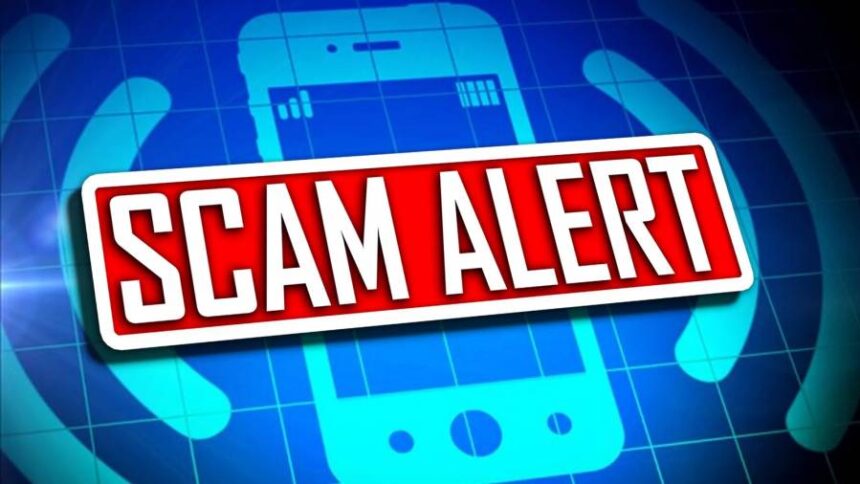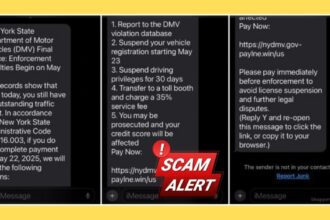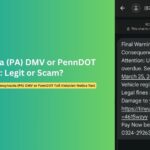Americans across the nation are being bombarded with sophisticated text message scams claiming they have unpaid Outstanding traffic tickets that require immediate payment to avoid severe penalties. These fraudulent messages impersonate state courts, DMVs, and law enforcement agencies, creating urgent scenarios designed to trick victims into providing personal information and financial details to criminal organizations.
What makes these outstanding traffic ticket scams particularly dangerous is their exploitation of universal driver experiences—nearly every driver has received a legitimate traffic ticket at some point, making the fraudulent messages seem plausible. The scammers leverage this familiarity, combined with threats of license suspension, vehicle impoundment, and legal prosecution, to create panic that prevents critical thinking about the message’s legitimacy.
This comprehensive guide reveals how these scams operate, helps you identify the warning signs, and provides essential protection strategies based on analysis of documented cases across multiple states. Understanding these criminal tactics and knowing how to respond can protect you from financial loss, identity theft, and the long-term consequences of compromised personal information.
Recent investigations reveal these outstanding traffic ticket scams are part of a coordinated international criminal enterprise that has been systematically targeting Americans since early 2024, adapting their tactics across different states while maintaining consistent underlying patterns that informed citizens can learn to recognize and avoid.
Overview of Outstanding Traffic Ticket Text Scams
Outstanding Traffic ticket text scams represent a sophisticated evolution in government impersonation fraud, targeting one of the most universal experiences shared by American drivers. These criminal operations exploit the anxiety and inconvenience associated with traffic violations to create convincing scenarios that bypass normal skepticism and prompt immediate compliance with fraudulent demands.
The scam campaign operates as part of a larger coordinated criminal enterprise that has been systematically targeting multiple states since April 2024. What began as simple toll road impersonation has evolved into a comprehensive government fraud operation that now encompasses traffic courts, parking authorities, DMVs, and various law enforcement agencies. This evolution demonstrates the criminals’ ability to adapt and expand their tactics based on victim responses and law enforcement countermeasures.
Intelligence analysis reveals this is likely an international operation, with documented cases showing messages originating from foreign phone numbers, particularly Philippines (+63) and UK (+44) country codes. The use of foreign hosting services, URL shorteners, and domain structures suggests the criminal infrastructure is intentionally located outside U.S. jurisdiction to complicate law enforcement response and prosecution efforts.
The financial impact of these scams extends far beyond immediate monetary theft. Victims who provide personal information face ongoing risks of identity theft, unauthorized account access, and credit damage that can persist for years. The Federal Trade Commission reports that similar government impersonation scams cost Americans hundreds of millions of dollars annually, with traffic-related fraud representing a growing segment of these losses.
What makes outstanding traffic ticket scams particularly effective is their exploitation of legitimate legal procedures and terminology. The criminals demonstrate sophisticated understanding of actual court processes, penalty structures, and government communication methods, allowing them to create messages that closely mimic legitimate traffic violation notices while including subtle indicators that expose their fraudulent nature.
The geographic scope of these scams appears to be nationwide, with documented cases in Pennsylvania, New York, Illinois, Tennessee, Florida, and other states. Each state-specific version adapts to local agency names and procedures while maintaining consistent underlying criminal methodologies, suggesting a well-resourced operation with capabilities for extensive research and customization.
The persistence of these campaigns, continuing for over a year despite widespread media attention and law enforcement warnings, indicates substantial financial returns that justify continued criminal investment in new tactics and expanded targeting. This suggests Americans should expect outstanding traffic ticket scams to continue evolving and expanding rather than diminishing over time.
How the Scams Work
Outstanding Traffic ticket text scams operate through a sophisticated multi-stage process designed to exploit human psychology, create false authority, and prevent victims from conducting proper verification before providing sensitive information or making payments to criminal organizations.
Stage 1: Target Acquisition and Mass Distribution
Criminals obtain phone numbers through various acquisition methods including data breaches, social media scraping, purchased contact databases, and automated generation targeting specific area codes. They deploy industrial-scale text messaging systems capable of reaching thousands of potential victims simultaneously, relying on statistical probability to deliver their fraudulent messages to actual drivers who may have legitimate concerns about traffic violations.
Stage 2: Authority Impersonation and Legitimacy Creation
The fraudulent messages are carefully crafted to impersonate legitimate government agencies, including state courts, DMVs, parking authorities, and law enforcement departments. They incorporate official-sounding language, reference actual legal procedures, and use terminology that drivers recognize from legitimate traffic violation experiences. This familiarity helps bypass initial skepticism and creates an assumption of legitimacy that prevents immediate critical analysis.
Stage 3: Urgency Manufacturing and Psychological Pressure
The scammers create artificial urgency through extremely tight deadlines—typically 12 to 48 hours—claiming that immediate action is required to avoid severe consequences. This time pressure is psychologically designed to prevent victims from taking time to verify the communication through official channels, research the claims being made, or consult with family members or advisors who might identify the fraud.
Stage 4: Fear-Based Compliance Motivation
The messages exploit multiple psychological pressure points by threatening consequences that would significantly disrupt victims’ daily lives: driver’s license suspension, vehicle registration cancellation, court appearances, legal prosecution, credit score damage, and vehicle impoundment. These threats are calibrated to create maximum anxiety while remaining plausible enough to avoid immediate dismissal as obviously fraudulent.
Stage 5: Technical Deception and Website Redirection
When victims click provided links, they’re redirected to sophisticated fake websites that closely mimic official government portals. These sites employ professional design elements, official logos, convincing formatting, and secure connection indicators to create an illusion of legitimacy. The sites are typically hosted on international servers using deceptive domain names that appear official but use suspicious extensions and structures that trained observers can identify as fraudulent.
Stage 6: Information Harvesting and Financial Exploitation
The fake websites request comprehensive personal and financial information under the guise of “resolving” the fake traffic violation. This includes full names, addresses, driver’s license numbers, Social Security numbers, complete credit card information, and sometimes bank account details for “direct payment” options. Advanced versions may request additional verification information that can be used for comprehensive identity theft operations.
Stage 7: Ongoing Criminal Exploitation and Expansion
Once criminals obtain victim information, they initiate multiple exploitation vectors including immediate financial fraud through unauthorized purchases, accessing victims’ legitimate government accounts using stolen credentials, selling comprehensive personal information to other criminal organizations, and using the collected data for sophisticated long-term identity theft schemes that may not be discovered for months or years.
Fake Text Patterns: Common Outstanding Traffic Ticket Fraud Examples
Analysis of documented outstanding traffic ticket scams across multiple states reveals consistent patterns and critical errors that expose their fraudulent nature:
Example 1: Generic Court System Impersonation
URGENT: Traffic Court Final Notice
Our records show you have an unpaid traffic violation requiring
immediate attention. Case #: TC-2025-4471
Violation: Speeding – School Zone
Fine Amount: $165.00
Late Fees: $45.00
Total Due: $210.00
Failure to pay by May 31, 2025 will result in:
– Driver’s license suspension
– Vehicle registration hold
– Additional penalty fees
– Possible arrest warrant
Pay immediately to avoid legal action:
https://trafficcourt-pay.secure-gov.win/case/TC-2025-4471
Questions? Call: +44 20 XXXX XXXX
Example 2: DMV Traffic Division Scam
State DMV – Traffic Violations Unit
FINAL NOTICE – IMMEDIATE ACTION REQUIRED
Driver License: XXXXXXX847
Outstanding Balance: $89.50
Violation Date: 04/15/2025
Location: Interstate Highway
If not resolved within 24 hours:
1. License suspension effective immediately
2. Vehicle impoundment authorization
3. Court judgment and legal collection
4. Credit bureau reporting
Resolve online now: https://statedmv.traffic-resolve.vip/pay
Or reply STOP to schedule court appearance
Customer Service: +63 917 XXX XXXX
Example 3: Parking Violation Authority Scam
City Parking Authority – Violation Enforcement
Vehicle: License Plate [Your State] ABC1234
Citation: UNPAID – FINAL NOTICE
Amount: $75.00 + $25.00 late fee = $100.00
Violation: Expired Meter – Downtown District
Date: May 10, 2025, 2:15 PM
URGENT: Pay within 12 hours or face:
– Vehicle boot/tow authorization
– Driver license point assessment
– Collection agency referral
– Municipal court summons
Pay securely: https://cityparking.gov-payment.at/urgent
Call immediately: +1-555-PARK-PAY
Example 4: Multi-Agency Confusion Scam
Joint Traffic Enforcement Notice
DMV • COURTS • STATE POLICE
Multiple unpaid violations detected:
– Speeding citation: $125.00
– Parking violation: $50.00
– Court processing fee: $35.00
TOTAL DUE: $210.00
Combined enforcement action begins in 18 hours:
✓ License suspension by DMV
✓ Vehicle impoundment by State Police
✓ Court judgment processing
✓ Credit reporting initiated
Emergency payment portal:
https://joint-enforcement.state-gov.win/emergency-pay
Reply Y to confirm receipt and avoid enforcement
Critical Red Flags in These Examples:
- International phone numbers (+44 UK, +63 Philippines)
- Suspicious domains (.win, .vip, .at extensions)
- URL shorteners and unofficial sites
- Immediate deadline pressure (12-24 hours)
- Multiple agency confusion (mixing jurisdictions inappropriately)
- Reply instructions (“Reply Y”, “Reply STOP”)
- Vague location details without specific jurisdiction information
Red Flags: How to Identify Fraudulent Outstanding Traffic Ticket Texts
Several immediate warning signs can help drivers identify fraudulent outstanding traffic ticket messages:
1. Communication Method Red Flags
| Legitimate Traffic Communications | Scam Communications |
|---|---|
| Official mail to registered address | Unsolicited text messages |
| Court summons via certified mail | Text with urgent deadlines |
| Agency letterhead and seals | Generic text formatting |
| Specific court appearance dates | Immediate online payment demands |
Legitimate traffic violations are typically communicated through official mail, not text messages.
2. Technical Warning Signs
- International phone numbers: Government agencies don’t use foreign phone services
- Suspicious domains: Official sites end in .gov, not .win, .vip, .at, or .com
- URL shorteners: Government agencies use full official domain names
- Generic email addresses: Legitimate agencies use official domain emails
3. Content and Language Red Flags
- Urgent deadlines: Legitimate violations provide reasonable time for response
- Threatening tone: Official communications are professional, not intimidating
- Generic details: Real violations include specific location, date, time, officer information
- Payment method demands: Legitimate payments are made through established official channels
4. Authority and Jurisdiction Issues
- Mixed agency references: Real violations come from single appropriate authority
- Vague jurisdiction claims: Legitimate tickets specify exact location and issuing authority
- Impossible penalty combinations: Mixing parking, traffic, and court penalties inappropriately
- Process violations: Threatening immediate action without proper legal procedures
5. Financial and Payment Red Flags
- Immediate payment demands: Official violations allow time for contest or payment
- Credit card demands via text: Government agencies don’t request card details through text
- Gift card payment options: Legitimate agencies never accept gift cards
- Wire transfer requests: Official payments use established government payment systems
6. Verification Impossibilities
- No case number verification: Real violations can be verified through official court systems
- Missing officer information: Legitimate tickets include issuing officer details
- Unclear violation specifics: Real citations specify exact violation codes and descriptions
- No contest options: Legitimate violations always provide contesting procedures
How to Protect Yourself from these Scams
Implementing comprehensive protection strategies can significantly reduce your risk of falling victim to these sophisticated fraud attempts:
Verify Through Official Channels
- Court websites: Check official court systems for actual pending cases
- DMV verification: Contact your state’s DMV directly using verified phone numbers
- Law enforcement confirmation: Call the police department that allegedly issued the citation
- Never use provided contact information: Always look up official numbers independently
Understand Legitimate Traffic Violation Procedures
- Official mail requirement: Real violations come via certified or registered mail
- Specific information inclusion: Legitimate tickets include detailed location, time, officer information
- Contest options: All real violations provide clear procedures for contesting charges
- Reasonable timeframes: Official violations allow weeks or months for response, not hours
Implement Digital Security Practices
- Bookmark official sites: Save legitimate government websites to avoid typing errors
- Use verified apps: Download only official government apps from verified app stores
- Enable security features: Protect devices with passwords, biometrics, and security updates
- Monitor accounts: Regularly check financial and government account activity
Educational Awareness and Family Protection
- Stay informed: Follow state attorney general and consumer protection alerts
- Family education: Ensure all family members understand these scam tactics
- Community sharing: Discuss scam awareness in neighborhood and social groups
- Elder protection: Provide extra guidance to elderly family members who may be targeted
Financial Account Security
- Account monitoring: Check bank and credit card statements for unauthorized activity
- Credit monitoring: Consider services that alert you to suspicious credit activity
- Fraud alerts: Place temporary fraud alerts if you suspect information compromise
- Strong passwords: Use unique, complex passwords for all financial and government accounts
What to Do If You Receive a Fake Outstanding Traffic Ticket Text
If you receive a suspicious text claiming you have unpaid traffic violations, take these immediate steps:
Immediate Response Protocol
- Do not click any links provided in the message
- Do not reply to the message, even with “STOP” or questions
- Do not call any phone numbers included in the text
- Take a screenshot for documentation and reporting purposes
- Do not forward the message to others (this can spread the scam)
Verification and Investigation Steps
- Check official court records: Visit your local court’s official website to search for actual cases
- Contact relevant agencies: Use verified phone numbers to contact courts, DMV, or police departments
- Review driving history: Check your official driving record through legitimate state DMV services
- Consult recent driving: Consider whether you’ve recently driven in areas where violations might have occurred
Comprehensive Reporting Procedures
- Federal Trade Commission: Report at reportfraud.ftc.gov or call 1-877-FTC-HELP
- FBI Internet Crime Complaint Center: File detailed complaint at www.ic3.gov
- State Attorney General: Contact your state’s consumer protection division
- Phone carrier: Forward the message to 7726 (SPAM) and use “Report Junk” features
- Local law enforcement: File reports if you’ve suffered financial losses
If You’ve Already Responded to the Scam
If you’ve clicked links or provided information:
- Change all passwords: Update financial and government account passwords immediately
- Contact financial institutions: Alert banks and credit card companies about potential fraud
- Monitor all accounts: Watch for unauthorized transactions, new accounts, or suspicious activity
- Credit report surveillance: Obtain free credit reports and monitor for identity theft signs
- Consider credit freezes: Place temporary security freezes on credit files
- Document all actions: Keep detailed records of communications and protective steps taken
Long-term Protection Measures
- Ongoing monitoring: Continue watching accounts and credit reports for months after incident
- Identity theft insurance: Consider coverage for potential long-term identity theft consequences
- Official communication preferences: Update settings with legitimate agencies for preferred contact methods
- Education updates: Stay informed about evolving scam tactics and protection strategies
Frequently Asked Questions (FAQs)
1. Is a outstanding traffic ticket notice received via text message legitimate?
No, outstanding traffic ticket notices sent via text message are fraudulent. Legitimate traffic violations are communicated through official mail sent to your registered address, typically via certified or registered mail. Courts, DMVs, and law enforcement agencies do not send traffic violation notices, payment demands, or legal threats through unsolicited text messages. Any text claiming you have unpaid traffic tickets requiring immediate action is a scam designed to steal your personal information and money.
2. How can I verify if I actually have outstanding traffic tickets or court cases?
To check for legitimate traffic violations, use only official verification methods: visit your local court’s official website and search their case database, contact your state’s DMV directly using verified phone numbers from their official website, visit the courthouse in person to speak with clerks, or check your official driving record through legitimate state DMV services. Never use contact information provided in suspicious text messages, and always navigate to official websites independently rather than clicking links in messages.
3. What personal information should I never provide in response to traffic ticket texts?
Never provide your Social Security number, driver’s license number, credit card information, bank account details, home address, date of birth, or any passwords via text message. Legitimate traffic violation payments are made through official court systems, government websites, or in-person at court offices—never through links sent via text message. Be especially suspicious of requests for gift card numbers, wire transfers, or immediate electronic payments, as these are classic scam payment methods that legitimate courts never use.
4. Are there legitimate ways courts or traffic authorities might contact me about violations?
Yes, legitimate traffic violation communications come through official mail sent to your registered address (often certified or registered mail), official notices posted on your vehicle by law enforcement officers, court summons delivered by official process servers, or notifications when you log into official court or DMV online accounts that you’ve previously established. However, these legitimate communications will never demand immediate payment via text message links or threaten instant arrest without proper legal procedures.
5. What should I do if I’m unsure whether a traffic violation communication is legitimate?
When in doubt, always verify independently through official channels. Do not use any contact information provided in the suspicious message. Instead, visit official court websites directly, call verified court or DMV phone numbers, visit courthouse offices in person, or consult with legal professionals if needed. Contact your state’s Attorney General consumer protection division if you need guidance on verifying government communications. Remember that taking time to verify is always better than risking becoming a victim of fraud.
Conclusion
Outstanding Traffic ticket text scams represent a sophisticated and evolving threat that exploits one of the most universal experiences in American life—dealing with traffic violations. The criminals behind these operations demonstrate advanced understanding of legal procedures, government processes, and psychological manipulation techniques that make their fraudulent messages increasingly difficult to distinguish from legitimate communications.
The key to protection lies in understanding that legitimate traffic enforcement follows established legal procedures that prioritize due process over immediate compliance. Real traffic violations provide reasonable timeframes for response, clear contest procedures, and official communication channels that can be independently verified. They never create artificial urgency or demand immediate payment through unsolicited text messages.
As these scams continue to evolve, staying informed about current tactics becomes essential. The criminals adapt their approaches based on public awareness campaigns, law enforcement countermeasures, and victim response patterns, requiring ongoing education and vigilance from potential targets. What remains constant is their reliance on fear, urgency, and impersonation of authority to bypass critical thinking and prompt immediate compliance.
The financial and personal security impacts of falling victim to these scams extend far beyond immediate monetary losses. Identity theft, compromised financial accounts, and long-term credit damage can persist for years after the initial fraud incident. Prevention through education and verification practices is far more effective than attempting to recover after becoming a victim.
Remember that legitimate government agencies follow established procedures, provide reasonable timeframes for addressing issues, and maintain official communication channels that can be independently verified. When faced with unexpected traffic violation claims, always verify through official channels rather than responding to unsolicited text messages, regardless of how urgent or official they appear.
The persistence and evolution of these criminal campaigns over more than a year demonstrates that Americans should expect outstanding traffic ticket scams to continue adapting and expanding rather than diminishing. Maintaining awareness of current tactics, understanding proper verification procedures, and sharing knowledge with family and community members creates a collective defense against these sophisticated criminal operations.
By staying informed about evolving scam tactics and maintaining consistent verification practices, drivers can protect themselves while helping to reduce the overall effectiveness of these criminal enterprises. The goal is not just individual protection but contributing to a broader informed public that makes these criminal operations less profitable and sustainable over time.
This article incorporates analysis of documented outstanding traffic ticket scam cases from multiple states, official guidance from law enforcement and consumer protection agencies, and established best practices for fraud prevention. For the most current scam alerts and protection resources, always consult official government websites and verified law enforcement sources.
Stay informed about the latest scam alerts, consumer protection strategies, and digital security updates with ShoppersVila.com – your trusted source for staying ahead of evolving fraud tactics and protecting your personal and financial security.









































